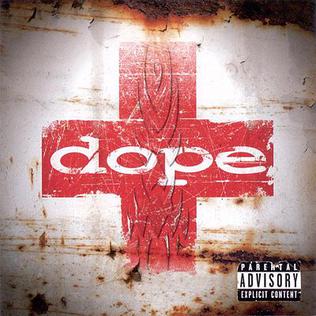 Hello folks, sorry for the wait! Today’s update will see us continuing our series of Cristina reviewing every Dope studio album ever. And it’s a good one, guys. It’s #2 on our three best Dope albums: it’s the one and only Group Therapy.
Hello folks, sorry for the wait! Today’s update will see us continuing our series of Cristina reviewing every Dope studio album ever. And it’s a good one, guys. It’s #2 on our three best Dope albums: it’s the one and only Group Therapy.
But first, let’s get a disclaimer out of the way… I am not a journalist and have never claimed to be one. I’m just a fan sharing my thoughts and experiences with this album. I have a big mouth and a platform, so here I am!
Group Therapy was released on October 21st, 2003, and marked Dope’s first album after parting ways with Epic/Flip Records, citing Epic’s lack of promotion and support. While the media might suggest that reactions to this album were mixed, it received widespread acclaim among Dope’s fanbase. One reviewer noted, “The band has matured a lot but still has room to grow, and I hope that one day they land a real masterpiece.” Some critics drew parallels between Dope’s sound on this album and that of Linkin Park and Korn, though these comparisons seem a bit of a stretch.
Group Therapy also enjoyed some success in the mainstream: “Today is the Day” was the theme for WWE’s No Mercy event in October of 2003. (Check out announcer Michael Cole shouting out Dope in this ad from the broadcast right here!)
So what’s the verdict? Well, here’s my analysis. Let’s try to do a bit better than critics of the time, hm?
Cristina’s POV: The Review
Group Therapy’s sound is both gritty and polished, with powerful guitar work that complements Edsel Dope’s vocal intensity. The production strikes a balance between the chaotic and the controlled, reflecting the album’s themes of struggle and resilience. The lyrics delve into inner conflict and the search for self-acceptance, resonating with anyone who has faced their demons head-on.
One of the standout tracks on the album is “I Am,” which captures the essence of Dope’s sound by combining heavy guitar riffs with catchy choruses. I’ve often described “I Am” as the “fuck you” anthem you didn’t know you needed, and that still rings just as true today. Another highlight is the track “Burn,” which offers a relentless energy that ignites listeners with its passion. These songs demonstrate Dope’s knack for crafting memorable hooks without sacrificing intensity.
Compared to their earlier albums, Group Therapy marks a progression in both sound and lyrical depth. While Felons and Revolutionaries introduced the world to Dope’s unique blend of industrial and metal, Group Therapy refines and expands upon that foundation. The album feels more cohesive, with each track contributing to a larger narrative of personal and collective catharsis.
All in all, Group Therapy is a satisfying mix of serenity and sanguinity fused with the rage and defiance characteristic of Dope’s earlier offerings—and then some. It’s a more than worthy entry among the top three Dope studio albums.
Join me next in our series as I review an album that has a lot of nostalgia for me. It’s American Apathy. Often overlooked in the conversation, it’s time to shine the spotlight on this album that’s brought us several iconic tracks. Stay right here with us.
